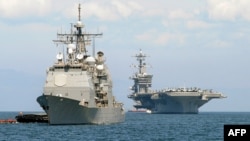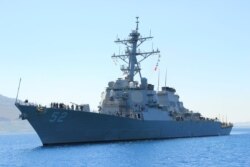An old geopolitical hotspot is poised to boil again amid the coronavirus pandemic, with U.S. and Chinese warships stepping up their presence in the South China Sea.
“This week the United States conducted two successful freedom of navigation operations in the South China Sea. The USS Barry and the USS Bunker Hill both started and ended a full transit at a time and place of our choosing, as we always do,” Chief Pentagon spokesman Jonathan Hoffman told reporters Friday.
The USS Bunker Hill, a guided-missile cruiser deployed to the Western Pacific theater, sailed through waters near the Spratly Islands that are claimed by China and several other countries on Wednesday. The USS Barry guided missile destroyer on Tuesday sailed through waters near the Paracel Islands, which are claimed by China, Vietnam and Taiwan.
Both transits are legally permitted by international law and challenged controversial maritime claims in the South China Sea.
Hoffman said China’s “interference with international navigation” and “excessive territorial claims” have persisted in the region despite “very strong push-back from the United States, international community, and many of their neighbors.”
“So we will continue to sail where we're legally allowed to, and we'll continue to encourage our allies and partners around the world to do the same,” the Pentagon spokesman added.
On Tuesday, a strongly worded statement on the Chinese Defense Ministry’s website said that the USS Barry illegally entered Chinese waters without permission and was promptly expelled by Chinese air and naval forces.
The back-to-back freedom of navigation operations by the U.S. military have been seen as a response to China’s aggressive activities in the disputed waters over last few weeks, including the sinking of a Vietnamese fishing vessel, the formal establishment of administrative districts to strengthen Beijing’s control over most of the South China Sea, and the deployment of a PLA carrier strike group in the area.
The United States on Wednesday accused China of taking advantage of the COVID-19 outbreak and increasing its military activities near Taiwan and in the South China Sea.
“The United States strongly opposes China's bullying,” U.S. Secretary of State Mike Pompeo said, ahead of a virtual meeting between the U.S. and the Association of Southeast Asian Nations (ASEAN) foreign ministers.
Jonathan Odom, a U.S. Navy commander, said Beijing may continue to raise the risk of conflict in order to achieve its strategic goals in the South China Sea.
“There is a greater potential that China will use that risk as a weapon against its neighbors, and there is a potential that some of its neighbors may shy away. I think the U.S. has the military capability and political will to not leave areas where we are committed to protect U.S. interests and those of our allies and partners,” said Odom in an interview with VOA Mandarin Service.
Both China and the U.S. have included the coronavirus pandemic among the reasons why the other side should show restraint in the South China Sea.
The Chinese military urged the U.S. to focus more on efforts to deal with the pandemic at home in its statement condemning the USS Barry’s operation.
In an earlier statement on the sinking of the Vietnamese fishing vessel, the Pentagon said the COVID-19 pandemic is a shared threat and called on all parties to refrain from destabilizing actions in the region.
State Department Correspondent Nike Ching contributed to this report.





